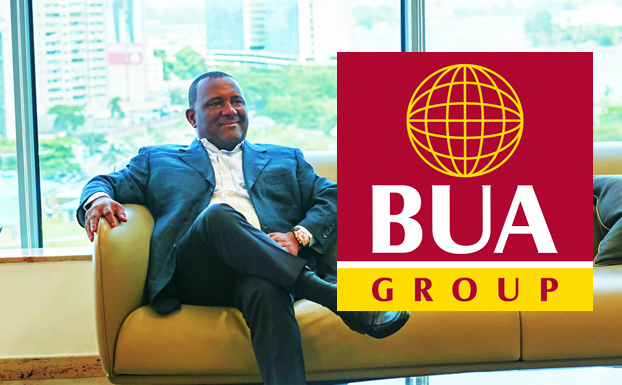Written By Rashidat Olushola Okunlade
Nigeria is currently facing many social and economic challenges to sustain advocacy for reforms and actions towards better economic and social outcomes for its citizens.
Manufacturers and the country, in general, have been suffering huge economic losses due to many factors across the country.
GDP growth will remain subdued, averaging 3.3% in 2023–24, with inflation elevated at 19.6% in 2023 before declining to 13.6% in 2024, reflecting efforts to shore up domestic food supply and the effects of contractionary monetary policy. The planned removal of the subsidy on Premium Motor Spirit (PMS) and increased revenue could further narrow the fiscal deficit to below 5% of GDP in 2023–24.
Abdul Samad Rabiu, Chairman of BUA Group, one of the most important diversified groups in Nigeria, active in food (sugar and oil) and infrastructures (cement, ports, real estate, the group’s manufacturing and philanthropic activities that have continued to bolster consumers loyalty and significant market share in Nigeria and Africa Continent.
In an economy where housing affordability is a pressing concern, BUA Cement’s recent move to slash cement prices has captured headlines and hearts. While this move seems like a silver lining for those seeking affordable housing solutions, this leaves nothing but wonder in the heart of many Nigerians about the sustainability of such a decision and the question is, is this a genuine act of goodwill, or is there more of it? Sincerely speaking this is a normal phenomenon and service to humanity of BUA Group.
The recent reduction in cement prices by BUA Cement Company Limited sparked many reactions on Monday, October 2, 2023, the President of the Real Estate Developers’ Association of Nigeria, Dr. Alhaji Aliyu Wamakko, and other industry leaders commended the founder and chairman of BUA Group, Abdul Samad Rabiu, for the admirable initiative.
Chairman BUA Group, Abdul Samad Rabiu’s decision to lower the price of cement to N3,500 in October 2023 in Abuja, which is a challenge to industry leaders to adopt similar measures but such has not been seen till the filing of this report.
BUA Cement’s price reduction highlighted the importance of integrity and tenacity in business and in the building industry to prioritise the welfare of Nigerians by reducing the costs of essential building materials and other products for the convenience of Nigerians.
BUA Group has continued to uplift the quality of life of Nigerians, and Africans. Abdul Samad Rabiu’s integrity, tenacity, and being a fairly business person. The reduction in cement prices has a positive impact on the lives of Nigerians, preventing project delays caused by high cement costs and the need for affordable housing. The challenges contributing to the housing deficit in Nigeria, including banditry, floods, and natural disasters, BUA Cement is committed to providing a solution.
Looking at the deficit in housing, is because of so many parameters from banditry, floods, and natural disasters that come, it has added to the deficit of housing in the country and the only way forward is to get cheaper cement because cement is the primary product for building.
Of course, BUA Cement’s announcement sent shockwaves through the market that it has reduced the ex-factory price of cement to N3,500 per bag (from N4,200). This news was met with widespread excitement and celebration, as it seemed to offer relief from the ongoing housing cost crisis in Nigeria. Given that shelter is one of the three basic human needs, BUA Cement’s price reduction has also been moved to sustainability.
Again, BUA Group takes cognisance of the fact that the dualisation project is being solely financed by BUA Group, and it is a demonstration of the commitment to infrastructural development within Nigeria.
The project which is worth N116 billion is part of BUA Group’s commitment to support the Federal Government in its effort to engender infrastructural development across the country.
As agreed, the N116 billion Kano-Kongolam highway which is being constructed by BUA Group with allied infrastructure will complement the ongoing rail infrastructure projects of the Federal Government in the North West region of Nigeria, and also open up more economic opportunities for Nigeria and the greater West African region.
BUA Group is on the same page with the Federal Government as it is committed to developing the country through Public Community Private Partnership, (PCPP). The expanded Kano-Kongolam dual carriage highway upon completion will connect three states namely; Kano, Jigawa, and Katsina, and improve interstate travel, make it easier to trade goods and services between the three states, and serve as a major artery for intra-African trade.
The Group has strongly keyed into the backward integration program of the government, which is expected to reduce demand for forex
As you are aware, BUA Group is one of the most important diversified conglomerates in Nigeria, and by that, it has been on the top chart of the listed company in Nigeria by market capitalisation, particularly as we operate in the areas of foods, cement, mining, and infrastructure, and now agricultural production and processing.
Again, as a manufacturer that has been in the business of cement manufacturing, BUA Group is no doubt bringing its expertise and experience to bear on agriculture, tapping into what is produced in Nigeria, and taking advantage of the country’s resources and competitive advantages.
In cement, all the inputs are primarily limestone and gypsum, which can be found in Nigeria. BUA Group as a business entity is thriving on excellence, commitment, innovation, and respect for customers and end-users who are key to the survival and sustainability of any business.
As a business entity that traditionally puts customers’ needs at the heart of its business activities, They have continued to appreciate its customers in diverse ways including through the provision of value-added services and quality products to meet their individual and business needs sustainably.
Over the years the group business has mainstreamed the expectations of our customers to serve them like kings, and in that regard, we have been fostering trust with our customers.
The group recognises its customers’ contributions to the success story of BUA over the years and they are committed to always serving them as kings to let them know that as a company, they have a team of dedicated professionals working together to ensure that the excellent services they have enjoyed over the years, continues. BUA Group remains committed to delivering an excellent service experience to its customers at all times and has really aided Nigeria’s economy.
This humanitarian gesture birthed Abdul Samad Rabiu Africa Initiatives (ASR Africa) which has catered to many Nigerians and across African countries.






